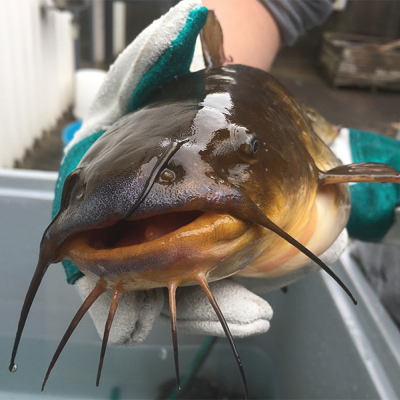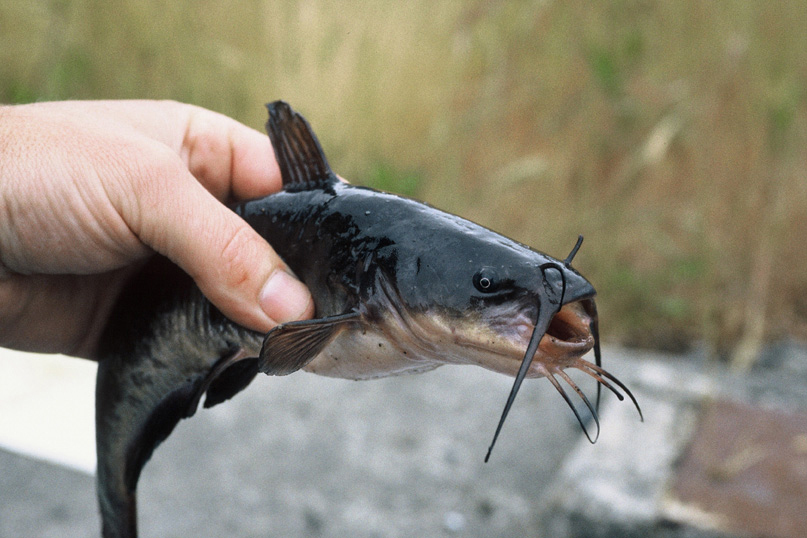Plea to stop catfish spread
28 March 2018
Media release: Plea to stop catfish spread
Rotorua Te Arawa Lakes Programme partners Bay of Plenty Regional Council, Rotorua Lakes Council and Te Arawa Lakes Trust are urging the public to help stop the spread of the catfish in the districts lakes.
The predatory pest species has spread and increased in numbers in Lake Rotoiti and now pose a real threat to other waterways.
The lakes programme partners say lake users need to be aware and need to ensure they are doing what they can to prevent the further spread of catfish.
Netting in Lake Rotoiti for the last three months has captured more than 11,000 of the brown bullhead catfish.
Although the majority were juvenile (40 – 80mm) the numbers in the lake could potentially be devastating to all Te Arawa Lakes.
Bay of Plenty Regional Council Biosecurity Team Leader Shane Grayling said catfish were opportunistic predatory scavengers and were considered the single biggest threat to koura.
“It could have been just one lake user’s negligence which has resulted in these 11,000 brown bullhead catfish being caught in Lake Rotoiti – it’s now up to all lake users to stop the pest incursion from spreading to other Te Arawa Lakes.
“To stop the spread of the catfish to other waterways all lake users need to check, clean and dry, not only their boats but trailers, propellers, fishing, sporting and earthmoving equipment when they are moving from one waterway to another.
“The potential impact of catfish varies from predation on species of significance to competition for food and space with other desirable species. We all have to do our part now to prevent them from spreading elsewhere.”
To date Regional Council has spent a significant amount of its biosecurity budget on control, surveillance and research on the catfish population and it was now looking at options to prevent the pest from spreading further, he said.
The regional council was investigating whether the introduction of brown trout or long fin eels to Lake Rotoiti could be used to combat the growing catfish population, as well as the possible use of using electric barriers and bubble curtains in the water to stop them from spreading to other lakes.
Mr Grayling said regional council were also working with the University of Waikato on using eDNA in water samples to help determine whether a species such as a catfish were present in it.
eDNA uses the DNA present in water samples to detect if a species is present. Once developed it could make detecting pest fish much quicker and easier.
Co-chair of the strategy group, which is the governance group for the Rotorua Te Arawa Lakes Programme, Mayor Steve Chadwick said she was extremely concerned about the increasing threat posed by catfish.
They were initially confined to Te Weta Bay but there has been a significant increase in both numbers and distribution.
“The lakes are extremely important to our community and to our district’s economy – they are a major reason why people live and visit here and we need to do whatever we can to protect them,” Mayor Chadwick said.
Rotorua Te Arawa Lakes Strategy Group Chairman Sir Toby Curtis said they had engaged with the Ngāti Pikiao Environment Society and Komiti Whakahaere on the issue.
“There is a significant concern about the impact of catfish on koura as a taonga species but also the general state of the Lake.”
The Te Arawa Lakes Trust was seeking every opportunity to provide support to researchers and managers working on this issue to ensure everybody can get this situation under control quickly, he said.
“We need the Te Arawa whānau who all use the lakes to check their boats to make sure there were no catfish being transferred to other Lakes – that would be a disaster.”
If you see anything fishy, please call us on 0800 STOP PESTS (0800 786 773) or send an email to STOP.PESTS@boprc.govt.nz
Catfish are a real threat to our Te Arawa lakes. Photo/Glen MacLean from DOC
For further media information, please contact Ruth Keber, Marketing and Communications Advisor for the Rotorua Te Arawa Lakes Programme, Bay of Plenty Regional Council: ruth.keber@boprc.govt.nz

